Vanity Fair, November 1914
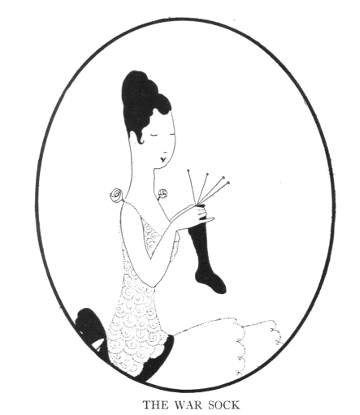
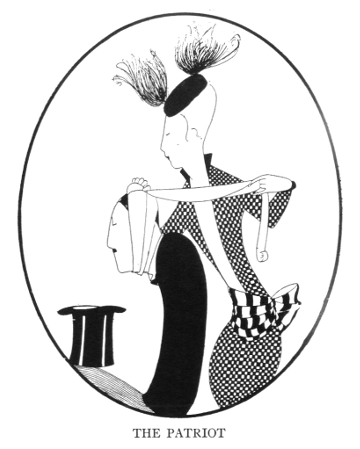
WAR STRICKEN
LONDON
Lady Clara and Her Set
Do Heavy Work for
the Sufferers
Text by Wodehouse and
Drawings by Fish
IN such London theatres as still keep open, knitting army-socks is all the rage just now. You can do a leg during a four-act comedy, and even at a Vaudeville performance, where there is more to distract the mind, a steady knitter may round out a heel. The only drawback to an otherwise praise-worthy practice is that it excites the actors so. The leading juvenile whose love-making in a current play caused Lady Clara to drop no fewer than six stitches in the course of a single act has become so insufferably swollen-headed that, according to his jealous comrades of the Green-Room club, he will not speak to a soul except Sir Herbert Tree, and then only when Sir Herbert speaks first. | THE war has done one thing, at any rate. It has brought out the latent resource and ingenuity of young Aubrey FitzCholmondbanks, the pride of the Bachelors’ Club. A martial spirit glows in Aubrey’s concave bosom, but he is near-sighted and color-blind, and the recruiting sergeants won't look at him. They argue—not without reason, say those who have seen Aubrey in action among the grouse—that if he loosed off a rifle at General von Kluck’s army, he would in all probability wing General Gallieni. In this crisis Aubrey has risen to the occasion nobly. He allows Lady Clara’s set to practice bandaging on him—showing for the Nth time that he also serves who only stands—and sits. |
MERELY an archaeological interest applies to the picture below representing divers nuts, or lads of the village, foregathering with the female of the species in a London night-club. Alas! under the new military regulations, even night-clubs must conform with the rule which closes all places which sell alcoholic liquor at eleven sharp every night. A night-club which closes at eleven might just as well be an afternoon club, and Lady Clara’s set is reeling under the blow. This picture shows a scene of nightly occurence before the new law was passed. The apparently agonized gentleman on the extreme left is parting with a few coins to a fair bandit who is going the round of the club.
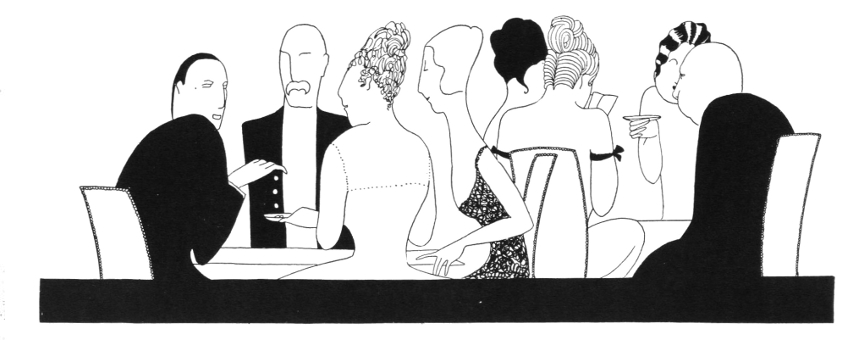
IT is with a pang of envy, which he tries vainly to suppress, that poor Corporal Frederick Smith, whose scared gaze is just visible above the coverlet in the picture, hears the reports of his late companions’ privations at the front. Smith was the first soldier to be invalided home, suffering from a bullet-graze in the forehead. The Red Cross has done its best for him. In one hour, it is officially stated, the suffering corporal had his face washed four times, and in the same space his temperature was taken so often that, when the thermometer was finally removed, he had acquired the taste, and begged to be allowed to chew another. The five nurses—among them, Lady Clara—who cluster about his bedside have but one regret: owing to the nature of his wound they cannot part his hair. But there is always a bright side to everything; and it is probably this fact that has enabled Corporal Smith to escape brain-fever. The doctors on the right are considering his plea for more nurses, the kindly gentleman on the right would give in, but the medic with the mustache is for amputating the entire nursing staff.



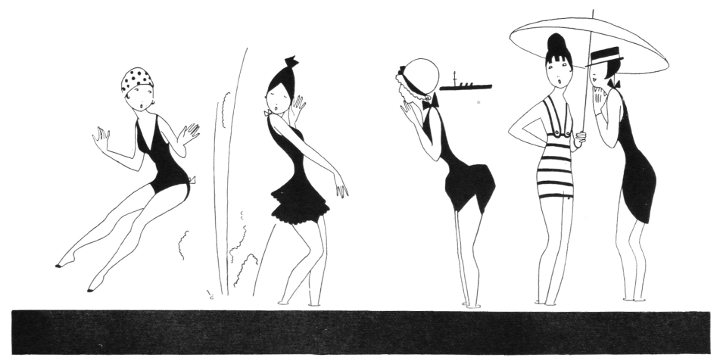
LADY CLARA DREAMS
Lady Clara, worn out with sock-knitting and Red Cross training, falls asleep and dreams of
next year’s Cowes, next year’s Trouville, and next year’s Opera.
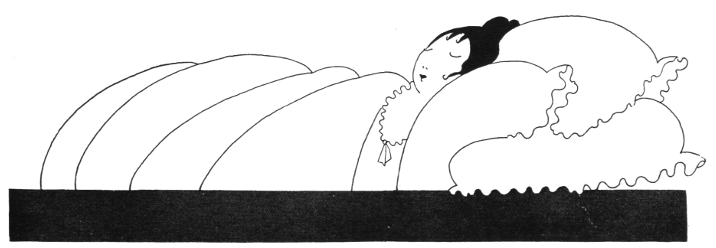
 Madame Eulalie’s Rare Plums
Madame Eulalie’s Rare Plums